ATB Standard Operating Procedures
ATB SOP & FAQ 2011 for OMB v2.docx
The Interagency Access Pass and Senior Pass Application Processes
ATB Standard Operating Procedures
OMB: 1024-0252
America the Beautiful –
The National Parks and Federal Recreational Lands Pass Program

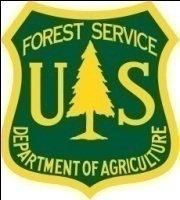
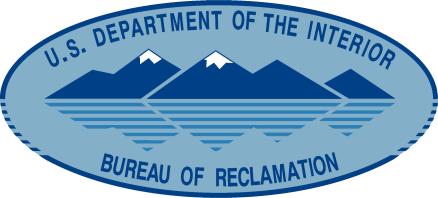
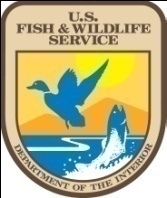
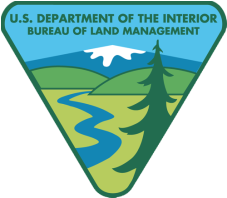
Interagency
Standard Operating Procedures
December 1, 2010
TABLE OF CONTENTS
What’s New for 2011? 4
Pass Program Background
Congressional Law 4
The Pass Program 4
Official Name 5
Frequently Asked Questions - Background 5
Pass Program – General Topics
Signs and Other Materials 6
Product Design 6
Hole Punch 7
Share the Experience Photo Contest 7
Golden Age and Golden Access 7
Exchanging the Golden Age & Access Ports for the Interagency Senior & Access Passes 7
Motorcycles 7
Pass Options – What is Right for the Visitor? 8
General Rules and Benefits for Interagency Passes
General Rules and Benefits 9
Frequently Asked Questions – General Pass Program 9
Interagency Annual Pass 11
Frequently Asked Questions – Annual Pass 12
Interagency Senior Pass 14
Frequently Asked Questions – Senior Pass 16
Interagency Access Pass 18
Frequently Asked Questions – Access Pass 21
Interagency Volunteer Pass 23
Frequently Asked Questions – Volunteer Pass 25
Supplemental Materials - Hangtag 27
Frequently Asked Questions – Hangtag Pass 28
Supplemental Materials – Decal 29
Frequently Asked Questions – Hangtag Pass 30
Inventory
Ordering Pass and Supplemental Stock 31
Damaged and Missing Stock 31
Sales and Accountability
Pass Sales 32
Upgrades 32
Voids/Refunds/Returns 32
Exchanges Involving Receipts from Automated Fee Machines 32
Damaged Passes 33
Lost or Stolen Passes 33
Pass Misuse 33
Accountability 33
Third Party Sales Agreements 34
Where Are the Interagency Passes Accepted? 35
Definitions 36
WHAT’S NEW FOR 2011?
In addition to being able to obtain Senior and Access Passes from field sites, the public now has an option to order Senior and Access Passes through the mail from USGS. (See Pages 14 and 18)
A new brochure is available from the USGS fulfillment center that includes more comprehensive information about the Pass program. Sites should discard the older brochures.
Remember, Annual decals for open-topped vehicles may now be issued to owners of Senior and Access Passes. (See Page 29)
PASS PROGRAM BACKGROUND
Congressional Law
Congress Passed the Federal Lands Recreation Enhancement Act (REA), Public Law 108-447, in December 2004. The law authorizes the Forest Service (USDA FS) within the Department of Agriculture, the National Park Service (NPS), Fish and Wildlife Service (FWS), Bureau of Land Management (BLM), and Bureau of Reclamation (Reclamation) within the Department of the Interior to charge fees at Federal recreation sites which meet certain criteria and reinvest a majority of the revenues into enhancing the site. REA replaced fee authority under the Recreation Fee Demonstration Program and the Land and Water Conservation Fund Act, and integrated several important “lessons learned” from those and other earlier fee authorities. Recreation fees continue to provide a vital source of revenue for improving facilities and services for visitors at a variety of public lands throughout the nation.
The Pass Program
The “America the Beautiful – the National Parks and Federal Recreational Lands Pass” Program is a suite of annual and lifetime passes that provides U.S. citizens and visitors an affordable and convenient way to access Federal recreation lands. Up to 100% of the Pass program’s proceeds are used to improve and enhance visitor recreation services.
REA established the “America the Beautiful – the National Parks and Federal Recreational Lands Pass” (Interagency Pass Program) to replace the Golden Eagle, Golden Eagle Hologram, Golden Age, and Golden Access Passports and the National Parks Pass (“old Passes”). The Interagency Pass Program provides four Pass options for the public to use at Federal recreation sites where entrance or standard amenity fees are charged. The four Passes and collateral materials that make up the program are:
Annual Pass: $80.00; anyone can purchase this Pass
Senior Pass: $10.00; valid for the lifetime of the Pass owner; must be 62 or older and a U.S. citizen or a permanent resident
Access Pass: Free for lifetime with documentation of permanent disability for U.S. citizens or permanent residents
Volunteer Pass: Earned with 500+ hours of volunteer service on the public lands
Hangtags: Used as a way to display Passes at areas without entrance booth staff
Annual Decals: For open-top vehicles to display at areas without entrance booth staff
The Interagency Pass Program was implemented January 1, 2007. Sites may not issue or sell any of the old Passes. Old Passes must be destroyed and documented according to agency policy.
The goal of the Interagency Pass Program is to promote consistency among the participating agencies. An Interagency Pass Workgroup with representatives from each of the participating agencies develops and oversees the program and these policies. The intention is to maintain a high-quality Pass program that is supported by the public and partner organizations.
The overall objectives of the program include:
Making the Passes more convenient to purchase and use.
Incorporating technology to allow for improved data collection and to prevent misuse.
Providing a durable, collectable, high quality product that promotes identity and support of Federal recreation lands
Providing opportunities for partnerships and education about recreational opportunities on Federal recreation lands.
Official Name
REA legislation established the name of the program as the “America the Beautiful – the National Parks and Federal Recreational Lands Pass”. The phrase “America the Beautiful” is trademarked, therefore, using it or an abbreviated acronym such as ATB is not permitted.
Frequently Asked Questions - Background
Which agencies participate in the program?
Bureau of Land Management (BLM) http://www.blm.gov
Bureau of Reclamation (Reclamation) http://www.usbr.gov
Fish & Wildlife Service (FWS) http://www.fws.gov
USDA Forest Service (USDA FS) http://www.fs.fed.us
National Park Service (NPS) http://www.nps.gov
Representatives from each of the five agencies, plus the Department of the Interior’s Office of Policy Analysis, comprise an Interagency Workgroup that oversees the program.
Why don’t all Federal recreation sites accept or issue the Passes?
Not all Federal recreation sites charge entrance or standard amenity fees.
The Passes cover entrance or standard amenity fees, not parking, expanded amenity, tour or other types of fees.
Not all Federal recreation agencies participate in the program. For example, U.S Army Corps of Engineers and Tennessee Valley Authority sites do not issue the Passes, yet, they might honor the Senior and Access Passes for camping discounts.
Some facilities and activities on Federal recreation lands are managed by private concessionaires. The concessionaires charge for their services as any private company does. Their contract with the individual agency dictates if the concessionaire has to accept the Interagency Passes. Concessionaires might operate parking lots, campgrounds, boat ramps, lodging and more on behalf of the agencies.
The majority of recreation sites on Bureau of Reclamation lands are managed by non-Federal partners.
What is USGS and what is its role in the Pass Program?
The USGS, or U.S. Geological Survey, is a Department of the Interior agency that is the contracted fulfillment provider for the program. USGS handles the functions of: inventory storage, fulfillment to field sites, retail partners and the public; and they manage the program’s call center.
How is the Pass program funded?
Revenue generated through “Central Sales” (internet sales and national retail partners) covers program costs including product design, production, fulfillment and marketing. Field sites are responsible for their own shipping costs.
How is revenue from the Pass program distributed among the participating agencies?
Revenue from field Pass sales remains within the agency. Proceeds from Central Sales will be shared among the five agencies after program expenses are paid.
PASS PROGRAM - GENERAL TOPICS
Signs and Other Materials
All signs and other materials (newspapers, self-pay envelopes, etc.) need to reflect the correct names and prices of the Interagency Passes as follows:
Interagency Access Pass - Free
Interagency Senior Pass - $10
Interagency Annual Pass - $80
Interagency Volunteer Pass – Free (optional)
Product Design
Passes:
All Passes consist of a four-color 3 ¼” x 2 ¼” plastic card with a title and serial number on the front, and a magnetic strip, signature line(s), and a code 128 barcode on the back.
The Annual and Volunteer Passes include the expiration date on the back.
A scenic image is imprinted on the front of each Pass. The Annual Pass, Volunteer Pass and decal share the same image that changes each year. The Senior and Access Pass images will remain the same throughout the life of the program.
The first two digits of the Pass number represent the last two digits of the year the Pass is printed. The third digit is an identifier of the Pass type.
Annual Passes will have a “1.” Sample sequence = 111000001 (year 2011 Annual Pass)
Senior Passes “2.” Sample sequence = 112000001 (year 2011 Senior Pass)
Access Passes “3.” Sample sequence = 113000001 (year 2011 Access Pass)
Volunteer Passes “4.” Sample sequence = 114000001 (year 2011 Volunteer Pass) and
Decals “5.” Sample sequence = 115000001 (year 2011 decal)
Collateral Materials:
Decals have the same image as the Annual Pass and include a place for an expiration date and a vehicle license plate number (sites should not keep vehicle license plate numbers on a log/register; they are only to be written on the decal in waterproof ink).
Hangtags are designed to display a Pass while hanging from a vehicle rearview mirror. One side of the hangtag displays the Annual Pass, and the reverse side is for the Senior or Access Pass.
The Brochure titled “America the Beautiful – The National Parks and Federal Recreational Lands Pass” includes basic information about the Interagency Pass Program, the participating Federal agencies and, stewardship and volunteer opportunities. This brochure should be offered to all visitors that are issued a Pass. Recreation sites may order the free brochure from USGS.
Hole Punch
The hole punch must be 1/8th of an inch to assure that the hole is not too big and covers only one month. One option for purchasing this type of hole punch is through GSA Advantage (Part #MCG301C).
Share the Experience Photo Contest
The image changes each year on the Annual and Volunteer Passes, as well as the decal. The image is selected through the annual Share the Experience photo contest which begins each year approximately Memorial Day and runs through to December 31. The contest is open to the public and is based on amateur photography, not professional. A panel of judges with representatives from each agency selects the Grand Prize winning image that is featured on the subsequent year’s Annual and Volunteer Pass and the decal. Information on the contest is available at http://www.sharetheexperience.org. Rack brochures and posters that promote the contest are shipped to field locations each May. Field sites may re-order brochures and posters as needed throughout the duration of the contest each year.
Golden Age and Golden Access Passes
Golden Age and Golden Access Passports will continue to be honored for the lifetime of the Pass owner. Both Passes, along with the new Interagency Senior and Access Passes, will be in circulation for many years.
At per person fee areas:
Golden Age and Golden Access Passports will continue to cover entrance or standard amenity fees for the Pass owner, spouse, children, and/or parents.
The Interagency Passes (Senior and Access) cover entrance or standard amenity fees for the Pass owner and up to 3 adults, not to exceed 4 adults (Children under 16 are always admitted free).
Exchanging the Golden Age and Golden Access Passports for the Interagency Senior and Access Passes
Paper Golden Age and Access Passports may be exchanged for the Interagency Senior and Access Passes free of charge in order to facilitate future data collection. However, if individuals do not wish to give up their old Pass, they are not required to do so. Paper Golden Age Passports are valid for the lifetime of the Pass owner.
Plastic Golden Age and Access Passports are valid for a lifetime. There is no need, and it is cost prohibitive to the agencies to exchange these Passes. If visitors ask to trade these in, explain that the Pass is still valid.
Plastic Golden Access Passports – If they wish to exchange the Pass do so at no charge and collect the old Pass.
Plastic Golden Age Passports – If the visitor would like the new Senior Pass they must purchase one for $10. They are not required to surrender the old Pass.
Check photo identification and signature to ensure the visitor is the Golden Age or Access Passport holder before exchanging these Passes.
Motorcycles
In the Code of Federal Regulations (CFR), motorcycles are referred to as vehicles. In the past, many recreation sites have opted to charge motorcycles a per person or other fee rather than a full vehicle fee. For consistency in Pass acceptance, all sites should now treat motorcycles as a vehicle.
Two individuals may sign the Annual Pass. At NPS, BLM, FWS, USDA FS, or Reclamation sites that charge an entrance or standard amenity fee as vehicles enter the site, the two individuals that sign an Interagency Annual Pass are allowed entrance on two separate motorcycles. Identification must match the signatures of the Pass owner(s).
When entering sites that are unstaffed but where parked vehicles are regularly checked for compliance (i.e., USDA FS and BLM), each motorcycle must display a valid Interagency decal. (See “DECAL” section, below).
At regularly staffed locations only one motorcycle will be admitted per Interagency Senior Pass, Interagency Access Pass, and Interagency Volunteer Pass.
An easy way to remember is: one signature, one motorcycle; two signatures, two motorcycles.
Pass Options – What is Right for the Visitor?
Asking a few key questions can help the visitor make an informed decision, and minimize the need to upgrade later. Taking a few extra seconds can improve the public’s understanding and support of the fee program and can enhance your agency’s image. It is important that visitors know they have options, whether it be paying a day use fee, purchasing a site specific annual Pass, or buying an Interagency Annual Pass.
To provide quality customer service and help determine the visitor’s needs, fee collection staff should ask the following types of questions:
Are you at least 62?
If the visitor’s car has a license plate indicating a disability you might ask, “Does someone in the vehicle have a permanent disability?”
Do you recreate only a few times per year? In the same location or region?
Are you visiting several Federal recreation sites? Across the nation?
Will you be visiting several Federal recreation sites this year OR on your trip?
Would you like the convenience of a Pass?
GENERAL RULES AND BENEFITS FOR INTERAGENCY PASSES
General Rules and Benefits
All Interagency Passes:
Cover entrance to FWS and NPS sites that charge an Entrance Fee and Standard Amenity Fees at USDA FS, BLM and Reclamation sites. Admit the Pass owner(s) and any accompanying Passengers in a private non-commercial vehicle at per vehicle fee areas, or at per person fee areas, the Pass owner(s) and up to 3 adults, not to exceed 4 adults. Children 15 and younger are admitted free of charge.
Are not valid for expanded amenity fees such as camping, tours, boat launches, or concession
fees. Except, the Interagency Access and Senior Passes may provide some discounts for the Pass owner.
Must be displayed in the vehicle windshield at unstaffed recreation areas where an entrance or standard amenity fee is charged. (A hangtag should be provided to all Pass purchasers).
Are punched with an expiration date at the time they are sold/issued (whether in person or over the internet).
Must be signed by the Pass owner(s) to be valid.
Are non-transferable. The Pass belongs only to the signer(s).
Are non-replaceable if lost or stolen. (At this time, Passes cannot be replaced because we have no way of tracking or canceling a Pass to prevent misuse.)
Are void if altered.
Are replaceable if damaged as long as identification is provided to validate ownership and a portion of the Pass is identifiable.
Are serial numbered and bar-coded for purposes of inventory tracking and accountability.
Do not provide a discount at cooperating association bookstores, etc.
Anytime a Pass holder presents an Interagency Annual or Volunteer Pass the expiration date and signature must be checked.
Since Passes are non-transferable, the verification of ownership is a legitimate component of the program. As stated on the back of the Pass, valid photo ID is required, and Pass signatures will be compared to verify ownership.
Note: Visitors are responsible for bringing Passes with them. Order confirmation letters, credit card receipts, credit card statements, or hangtags without Passes are not valid. If a visitor forgets to bring a Pass, he or she must pay the entrance or standard amenity fee. The Pass holder cannot later photocopy the Pass and mail it in with fee receipts for a refund.
Frequently Asked Questions – General Pass Program
How do I order Passes and collateral materials?
USGS is the fulfillment provider for all program supplies and materials.
Phone: 888-275-8747, option 1
Fax: 303-202-4693
Email: fedrecPass@usgs.gov
Internet: http://store.usgs.gov click “login” button in upper right-hand corner (provide your master SAP account and Password)
Note: Refer to your agency specific guidance for ordering product. Only persons listed as official contacts on an account with USGS can place orders. More than one person can be listed as an official contact based on agency location/preference. Should you forget or lose your Password, please contact USGS to reset it.
Are the Passes sold through third-party, retail vendors?
The Annual Pass is sold through vendor partners such as REI, Sierra Trading, etc.; no discounting is allowed.
The Senior and Access Passes are NOT sold/issued through retail vendor partners, but CAN be obtained through the mail.
What do I do if someone shows up with an unsigned Pass?
If a visitor presents an unsigned Pass have the visitor sign the Pass before allowing entry to the site.
Can lost or stolen Passes be replaced? Is there a way that the serial numbers can be
tracked?
No. Passes cannot be replaced if lost or stolen; a new Pass must be purchased. We do not currently have the capability to track Pass serial numbers across all five Federal land management agencies.
What should I do if a visitor forgets to bring his or her Pass?
Visitors are responsible for bringing their Passes with them. If they forget, they must pay the entrance or standard amenity fee. They will not be issued a refund for the entrance or standard amenity fee if they mail in the receipt and a copy of their Pass back to the site.
If a Pass is tattered and worn, can the Pass owner be issued a replacement?
Yes, generally as long as the month punched portion is identifiable on the Interagency Annual Pass or Volunteer Pass, and the signature is identifiable on the Interagency Senior or Access Pass, it may be exchanged for a new one, with proof of identification (e.g., driver’s license, birth certificate). Always err on the side of good customer service.
Will upgrades be provided?
The NPS has elected to upgrade NPS entrance receipts and Site Specific Annual Passes to the Interagency Annual Pass. At this time other agencies have elected not to provide upgrades. NPS will not upgrade receipts or Passes from the other agencies.
Does the Pass cover entrance for a school bus that has been converted into a motor home?
Yes, if it can be verified by asking the owner/driver that the vehicle is now a private motor home.
INTERAGENCY ANNUAL PASS
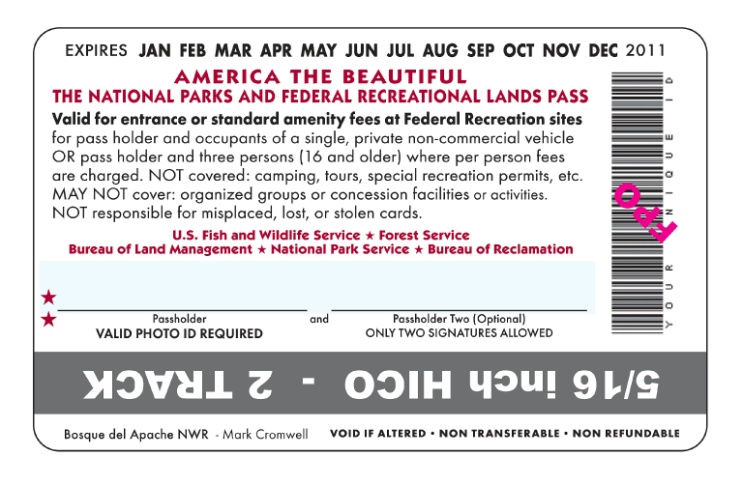
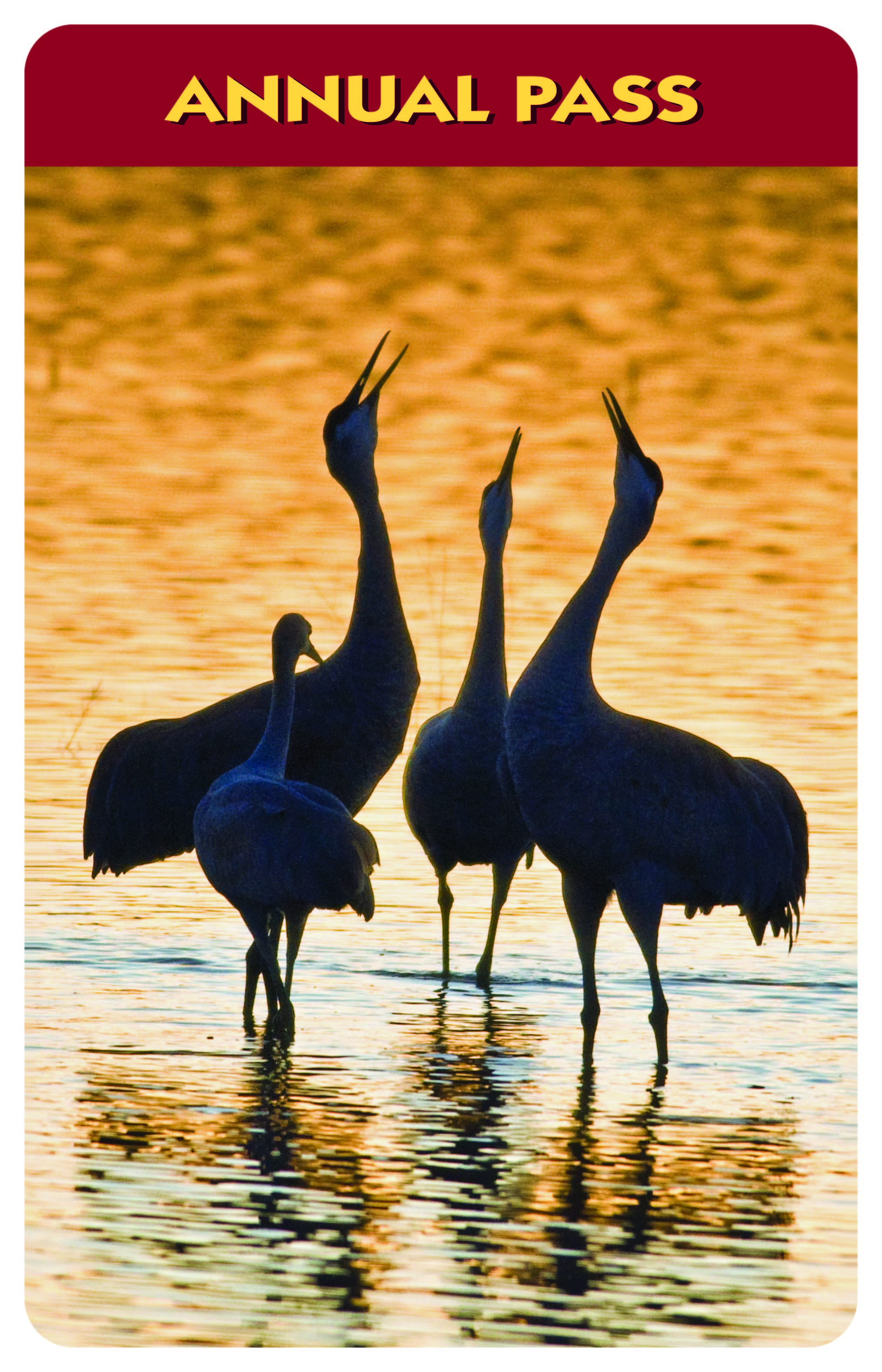
What is the Interagency Annual Pass?
The Interagency Annual Pass provides a convenient and affordable way to visit numerous recreation areas managed by five Federal agencies. Eighty to 100 percent of the proceeds from Pass sales are used to improve and enhance visitor recreation services.
(The Interagency Annual Pass replaced the Golden Eagle Passport, National Parks Pass and National Parks Pass with Golden Eagle Hologram in January 2007).
Cost
$80.00 USD
Availability
The Interagency Annual Pass is available for purchase:
In person at participating Federal recreation sites that charge an entrance or standard amenity fee, as well as at many Federal agency offices.
Via the internet at the USGS store, http://store.usgs.gov/Pass or through the toll free line
1-888-275-8747, option 1.
At participating cooperating associations and at some national retailers.
Validation
Interagency Annual Passes:
Are valid for one year from the month of purchase.
Must be punched at the time of purchase to expire 12 months from the month of purchase.
Are not valid until signed. The Annual Pass has two signature lines; the first Pass owner should sign the first signature line upon purchase/receipt; the second signature line is optional and may be signed at any time. The relationship of the Pass owners does not matter.
Sold over the internet are punched with an expiration date at the time of sale and must be signed prior to or upon first use.
May be purchased as a gift, but will be punched with an expiration date at the time of sale.
Additional Information
End of the month sales: If a visitor purchases a Pass on March 31, it must be punched to expire in March. It should not be punched to expire in April, or the visitor will get one full extra month of use. Regardless of the day of the month a Pass is purchased, it remains valid through the last day of that month of the following year.
Slow Shipment of Passes: If a visitor orders a Pass through the USGS Store prior to leaving on their trip but does not receive it, a purchase confirmation letter is not valid for entry, nor is a credit card statement or receipt showing purchase of a Pass. The visitor may choose to purchase another Pass, and when the Pass ordered from the USGS Store arrives, the visitor may return it to USGS for a refund (as long as the Pass has not been used).
Motorcycles: At sites that charge per vehicle entrance fees, the Annual Pass will cover entrance for the two Pass owners on two motorcycles or scooters. Signatures of both people must be on the Pass and must match identification.
Upgrades: The NPS will upgrade daily entrance receipts and park-specific annual Passes to the Interagency Annual Pass. At this time, the other agencies do not upgrade daily entrance receipts or Federal Recreation site-specific annual Passes to the Interagency Annual Pass. See the Upgrade section below.
Gifts, Awards and Raffles: Annual Passes may be purchased by the public or by the Government for use as employee awards, as prizes in raffles or as gifts. To maintain accountability and nationwide consistency the full price of the Pass must be paid.
Frequently Asked Questions – Annual Pass
Pass through the Internet (USGS or other national retail partner), should we accept it?
No. If a visitor did not receive an Annual Pass that was ordered via USGS or another partner website prior to leaving on their trip, they must purchase another Pass or pay the fee. A confirmation letter, credit card statement or receipt showing the purchase of a Pass is not valid for entry. If the visitor chooses to purchase another Pass they can return the Pass ordered through USGS for a refund (as long as the Pass is returned unused and unsigned).
Can a visitor upgrade daily entrance receipts to an Interagency Annual Pass?
At this time, NPS is the only agency that will upgrade entrance fee receipts or site specific annual Passes to the Interagency Annual Pass.
NPS will ONLY upgrade entrance receipts from other National Parks to an Annual Pass. They will NOT UPGRADE entrance or use receipts from other land management agencies. Any upgrades must be done IN PERSON AT A NATIONAL PARK. Further guidance is available in NPS RM 22.
Currently, the other four land management agencies (USDA FS, BLM, FWS, and BOR) do not upgrade receipts to Annual Passes.
If a visitor forgets to bring his/her Pass to a site and pays the entrance or use fee, can he/she mail in the receipt and a photocopy of their Pass and get a refund?
Refunds are not issued. Pass order confirmation letters, credit card receipts, and hangtags without Passes are not valid for entrance or use.
What if someone shows up with an un-punched Annual Pass?
Punch the current month; make sure the Pass owner’s signature is on the back of the card and verify that the signature matches identification.
REMEMBER: Refer to the General Pass Rules and Benefits on Page 9 that apply to ALL Interagency Passes
INTERAGENCY SENIOR PASS
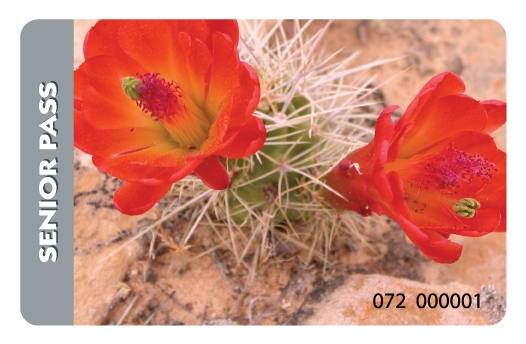

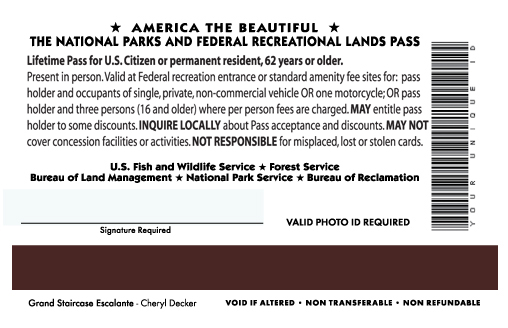
Senior
Passes issued by USGS through new mail-in application process will
have the Pass owner’s name pre-printed on the signature line.
What is the Interagency Senior Pass?
The Interagency Senior Pass is an affordable, lifetime pass available to U.S. citizens and permanent residents who are 62 years of age and older that provides a convenient and affordable way to visit numerous recreation areas managed by five Federal agencies. It also provides the Pass owner a discount on some expanded amenity fees such as camping (see Discount Guidelines section, below.) The Interagency Senior Pass replaced the Golden Age Passport (which will continue to be honored for the lifetime of the Pass owner).
Cost
$10.00 USD
Availability
The Interagency Senior Pass may be purchased by U.S. Citizens or permanent residents of the U.S. that are 62 years of age or older and may be obtained through one of two ways:
In Person
The Interagency Senior Pass is available for purchase at participating Federal recreation sites that charge an entrance or standard amenity fee, and at many Federal agency offices. No application is required to obtain a Senior Pass in person at a field site. Visitors should only be asked to present proof of residency and age as outlined below. If a visitor presents a completed application at the field site instead of sending it in to USGS, the visitor should be informed that the application is not necessary and asked to present proof of residency and age. Field sites MAY NOT collect or retain any applications for any reason.
Through the Mail
The Interagency Senior Pass may be obtained through the mail from USGS. Applicants must submit a completed application, proof of residency and age, the $10.00 fee for the Senior Pass, and an additional document processing fee ($10) to obtain a Pass through the mail. Once the application package is received the documentation will be verified and a Pass, with the Pass owner’s name pre-printed on it, will be issued to the applicant. The application will be available online at RECREATION.gov.
Field sites MAY NOT process mail applications. Any applications received through the mail by a field site should be forwarded to USGS as directed on the application.
Proof of Residency and Age
To verify proof of age and U.S. residency the visitor must show a valid driver’s license, Passport, birth certificate, or permanent resident card (green card).
To confirm U.S. residency a few questions may need to be asked. To help determine if a person is a permanent resident use the definition below for Domicile.
Domicile – the permanent residence of a person or the place to which he or she intends to return even though s/he may reside elsewhere.
The country in which a person is eligible to draw Federal health and retirement benefits is usually the country in which he or she is domiciled.
A person may have more than one residence, but only one domicile.
For example, the Interagency Senior Pass cannot be sold to a resident of Canada (or any other country outside the U.S.) who is visiting or who has a vacation home in the U.S. unless they are a U.S. citizen or permanent resident.
Validation
The Interagency Senior Pass has one signature line. The Pass is not valid until it is signed, so the purchaser must sign the Pass with first and last name in the presence of the seller at the point of sale.
If a visitor presents a Senior Pass with a pre-printed name in the signature line, the name must match the name on their identification.
Benefits
In addition to covering entrance and standard amenity fees at recreation areas managed by five Federal agencies, the Pass may provide a discount on some expanded amenity fees such as camping, and guided tours. Visitors should be advised to check with any recreation sites they plan to visit to determine whether any Pass discounts are offered.
Discount Guidelines
Individual Campsites: The discount only applies to the fee for the campsite physically occupied by the Senior Pass owner, not to any additional campsite(s) occupied by members of the Pass owner’s party.
Sites with Utility Hookups: If utility hookup fees are charged separately from the campsite fee there is no discount on the hookup fee. The discount only applies if the utility fee is seamless (combined with) the campsite fee.
Group Campsites and Facilities (including, but not limited to, group facilities, picnic areas or pavilions): There is no discount for group campsites and other group facilities that charge a flat fee. If the group campsite has a per person fee rate, only the Senior Pass owner receives a discount; others using the site pay the full fee.
Guided Tours: Only the Interagency Senior Pass owner receives a discount for guided tours.
Transportation Systems: There is no discount when an optional transportation service is offered. However, the Senior Pass should be honored:
If the transportation system is mandatory to access the primary resource of the recreation site, OR
If the transportation fee is collected in combination with the entrance or standard amenity fee.
Concessionaire Fees, Special Recreation, and Special Park Use Permit Fees: Discounts do not apply to concessionaire or contractor fees unless required as part of the agreement, permit or contract. Discounts do not apply to special recreation or special park use permits.
The U.S. Army Corps of Engineers (USACE) and Tennessee Valley Authority (TVA) were not included in REA. However these agencies will accept Interagency Senior Passes consistent with current policy. At this time these agencies do not sell the Passes.
Note: When giving Interagency Senior Pass owners information on discounts, please remember that there are many different situations where a discount may or may not be offered. Always encourage Pass owners to contact the local offices/sites they plan to visit to determine how their Pass will be accepted and what discounts might be offered.
Additional Information
Motorcycles: At sites with per vehicle entrance fees the Senior Pass will cover entrance for the
Pass owner on one motorcycle only.
Eligibility: The Interagency Senior Pass cannot be sold to a visitor prior to their 62nd birthday.
Lifetime Pass: The Interagency Senior Pass is valid for the lifetime of the Pass owner whose signature is on the Pass. If the Pass owner is deceased, the Pass may not be transferred to someone else, such as a spouse.
If a visitor arrives with an Interagency Senior Pass for which they are not eligible, apologize on behalf of the agency, explain that the Pass was issued in error, and ask the Pass holder to turn it over to you. If they refuse to do so, refer to your site’s Pass misuse and fraud procedures.
If a visitor forgets their Interagency Senior Pass, sell them another Interagency Senior Pass according to standard procedure, OR charge them the daily entrance fee, whichever they prefer.
Frequently Asked Questions – Senior Pass
Are Senior Passes available through the mail?
Yes. Customers can order a Senior Pass using a mail-order application. There is an additional $10 processing fee to order a Pass through the mail. The total cost of obtaining a Senior Pass through the mail is $20.00 ($10.00 Pass fee, plus $10.00 application processing fee). The application can be found online at Recreation.gov and http://store.usgs.gov/Pass.
Note: Senior Passes issued by USGS through mail-in application process will have the Pass owner’s name pre-printed on the signature line.
Are visitors required to fill out an application to purchase a Senior Pass if they purchase it in person?
No. Visitors only need to provide proof of age and U.S. residency or citizenship. Sites may not collect or retain any Senior Pass applications for any reason.
Why is the US Army Corps of Engineers accepting Senior Passes but not selling them?
The U.S. Army Corps of Engineers (Corps) was not included in the Federal Lands Recreation Enhancement Act of 2004, which gave agencies the authority to create the America the Beautiful - the National Parks and Federal Recreational Lands Pass. Although the Corps will not sell or issue the Passes, the Corps will accept the Senior Passes or Golden Age Passports as proof of eligibility for age-related discounts. More information may be found at: http://www.CorpsLakes.us/fees.
If someone Passes away, does the Senior Pass automatically transfer to their spouse?
No. The Senior Pass is not transferable.
A 62 year-old visitor from Canada wants to purchase a Senior Pass. May I sell it to them?
No. The Senior Pass is available only to U.S. citizens or permanent residents, age 62 years and older
The same visitor advises me that they have a winter home in Tucson where s/he resides six months during the year and pays US taxes. Does that make her/him eligible?
Generally no, to be eligible the visitor must be a US Citizen or Permanent resident and have documentation of age and residency. To confirm U.S. residency, you may want to ask a few questions.
Can I sell a visitor a Senior Pass a few weeks or days before his or her 62nd birthday?
No. To be eligible for the Pass they must be 62 or older. Issuing a visitor a senior Pass before the visitor’s 62nd birthday can lead to a bad experience for the visitor. There have been many instances where a visitor is issued a Pass, maybe just a few days before his birthday, only to have the Pass not accepted at the next site they visit because s/he is not 62. Do not put yourself or the visitor in this situation. It’s the LAW; a visitor may not be issued a Pass before his/her 62nd birthday.
What should I do if a visitor forgets to bring his or her Senior Pass?
Sell him or her another Senior Pass according to standard procedure, or charge them the daily entrance fee, whichever s/he prefers.
If a visitor arrives with a Senior Pass for which they are not eligible, what should I do?
Apologize on behalf of the agency, advise them that they were issued the Pass in error and ask them to turn it over to you. If they refuse to do so, refer to your site’s Pass misuse and fraud procedures. Collect the proper fee from the visitor.
REMEMBER: Refer to the General Pass Rules and Benefits on Page 9 that apply to ALL Interagency Passes
INTERAGENCY ACCESS PASS
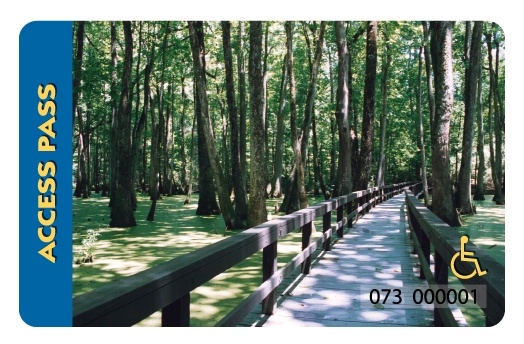

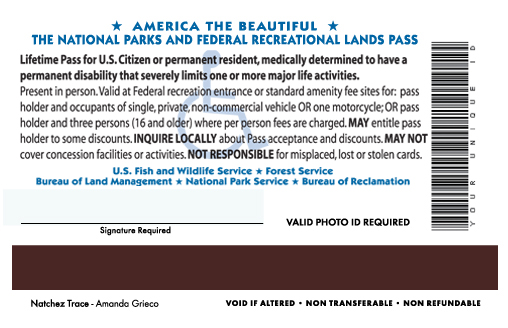
Access
Passes issued by USGS through new mail-in application process will
have the Pass owner’s name pre-printed on the signature line.
What is the Interagency Access Pass?
The Interagency Access Pass is a free, lifetime pass that is available to U.S. citizens or permanent residents that have been medically determined to have a permanent disability. The Interagency Access Pass covers entrance or standard amenity fees at sites managed by five Federal agencies. It also provides the Pass owner a discount on some expanded amenity fees such as camping (see Discount Guidelines section, below.) The Pass replaced the Golden Access Passport (which will continue to be honored for the lifetime of the Pass owner).
Cost
Free
Availability
The Interagency Access Pass may be issued to U.S. Citizens or permanent residents of the U.S., regardless of age, that have been medically determined to have a permanent disability that severely limits one or more major life activities and may be obtained one of two ways:
In Person
The Interagency Access Pass is available at participating Federal recreation sites that charge an entrance or standard amenity fee and at many Federal agency offices. No application is required to obtain an Access Pass in person at a field site. Visitors should only be asked to present proof of residency and documentation of permanent disability as outlined below. If a visitor presents a completed application at a field site instead of sending it in to USGS, the visitor should be informed that the application is not necessary and asked to present proof of residency and permanent disability. An Interagency Access Pass may be issued to a child to allow the Pass owner’s caregiver to enter a site for free as long as the Pass owner is present. Field sites MAY NOT collect or retain any applications for any reason.
Through the Mail
The Interagency Access Pass may be obtained through the mail from USGS. Applicants must submit an application, proof of residency and documentation of permanent disability, and pay the document processing fee of $10 to obtain a Pass through the mail. Once the application package is received by USGS, the documentation will be verified and a Pass, with the Pass owner’s name pre-printed on it, will be issued to the applicant. The application will be available online at http://store.usgs.gov/Pass and RECREATION.gov.
Field sites MAY NOT process mail applications. Any applications received through the mail by a field site should be forwarded to USGS as directed on the application.
Proof of Residency
To verify proof of U.S. residency the visitor must show a valid driver’s license, Passport, birth certificate, or permanent resident card (green card).
To confirm U.S. residency a few questions may need to be asked. To help determine if a person is a permanent resident use the definition below for Domicile.
Domicile – the permanent residence of a person or the place to which s/he intends to return even though s/he may reside elsewhere.
The country in which a person is eligible to draw Federal health and retirement benefits is usually the country in which s/he is domiciled.
A person may have more than one residence, but only one domicile.
Proof of Disability
A permanent disability is a permanent physical, mental, or sensory impairment that substantially limits one or more major life activities, such as caring for oneself, performing manual tasks, walking, seeing, hearing, speaking, breathing, learning, and working. See 7 C.F.R. §15e.103; see also 29 U.S.C. § 705(20).
Required Documentation: To be eligible for the Access Pass, an applicant needs to present documentation of permanent disability. If the applicant cannot produce documentation as listed below, s/he must read, sign, and date the Statement of Disability Form in the presence of the staff member issuing the Pass. If the applicant cannot read, someone else accompanying the individual may read, date, and sign the Statement of Disability Form on their behalf in the presence of the applicant and the staff member issuing the Pass. Copies of documentation presented must not be kept since it contains medical and other sensitive and personal information. Return all documentation to the applicant.
The applicant must submit one of the following documents (a, b or c) OR the applicant can complete the Statement of Disability Form as described in question (d) below.
a. A statement signed by a licensed physician attesting that the applicant has a permanent physical, mental, or sensory impairment that substantially limits one or more major life activities, and stating the nature of the impairment;
OR
b. A document issued by a Federal agency, such as the Veteran’s Administration, which attests that the applicant has been medically determined to be eligible to receive Federal benefits as a result of blindness or permanent disability. Other acceptable Federal agency documents include proof of receipt of Social Security Disability Income (SSDI) or Supplemental Security Income (SSI);
OR
c. A document issued by a State agency such as the vocational rehabilitation agency, which attests that the applicant has been medically determined to be eligible to receive vocational rehabilitation agency benefits or services as a result of medically determined blindness or permanent disability. Showing a State motor vehicle department disability sticker, license plate or hang tag is not acceptable documentation;
OR
d. If a person claims eligibility for the Interagency Access Pass, but cannot produce any of the documentation outlined in a through c, that person must read, sign and date the Statement of Disability Form, in the presence of the officer issuing the Pass. If the applicant cannot read and/or sign someone else may read, date, and sign the statement on his/her behalf in the applicant’s presence and the presence of the officer issuing the Pass.
The staff member issuing the Interagency Access Pass must not evaluate whether an applicant is permanently disabled. The issuing officer may only assess whether adequate documentation or signature on the Statement of Disability for the Pass has been submitted by the applicant.
Validation
The Interagency Access Pass has one signature line. The Pass is not valid until signed, so the visitor must sign the Pass with first and last name when the Pass is issued. If the visitor is unable to sign the Pass, a parent or guardian may sign it for them.
If a visitor presents an Access Pass with a pre-printed name in the signature line, the name must match the name on their identification.
Benefits
In addition to covering entrance and standard amenity fees at recreation areas managed by five Federal agencies, the Interagency Access Pass may provide a discount on some expanded amenity fees such as those for camping and guided tours. Visitors should be advised to check with any Federal recreation site they plan to visit to find out what discounts are available.
Discount Guidelines
Individual Campsites: The discount only applies to the fee for the campsite physically occupied by the Access Pass owner, not to any additional campsite(s) occupied by members of the Pass owner’s party.
Sites with Utility Hookups: If utility hookup fees are charged separately from the campsite fee there is no discount on the hookup fee. The discount only applies if the utility fee is seamless (combined with) the campsite fee.
Group Campsites and Facilities (including, but not limited to, group facilities, picnic areas or pavilions): There is no discount for group campsites and other group facilities that charge a flat fee. If the group campsite has a per person fee rate, only the Access Pass owner receives a discount; others using the site pay the full fee.
Guided Tours: Only the Interagency Access Pass owner receives a discount for guided tours.
Transportation Systems: There is no discount when an optional transportation service is offered. However, the Access Pass should be honored:
If the transportation system is mandatory to access the primary resource of the recreation site, OR
If the transportation fee is collected in combination with the entrance or standard amenity fee.
Concessionaire Fees, Special Recreation, and Special Park Use Permit Fees: Discounts do not apply to concessionaire or contractor fees unless required as part of the agreement, permit or contract. Discounts do not apply to special recreation or special park use permits.
The U.S. Army Corps of Engineers (USACE) and Tennessee Valley Authority (TVA) were not included in REA. However these agencies will accept Interagency Access Passes consistent with current policy. At this time they do not sell the Passes.
Note: When giving Interagency Access Pass owners information on discounts, please remember that there are many different situations where a discount may or may not be offered. Always encourage Pass owners to contact the local offices/sites they plan to visit to determine how their Pass will be accepted and what discounts might be offered.
Additional Information
Motorcycles: At sites with vehicle entrance fees the Access Pass will cover entrance for the Pass holder on one motorcycle only.
Lifetime Pass: The Interagency Access Pass is valid for the lifetime of the Pass owner whose signature is on the Pass. If the Pass owner is deceased, the Pass may not be transferred to someone else, such as a spouse.
Remember that most permanent disabilities are not visible. The only requirement of the person issuing the Pass is to determine whether or not proper documentation or proof of eligibility has been presented.
Statement of Disability: It is preferable that Interagency Access Pass applicants provide proper documentation; however, it is not always possible. The Statement of Disability is provided so that agency personnel are not placed in the position of evaluating whether an applicant is permanently disabled. An employee issuing the Pass may assess only whether adequate documentation has been submitted by the applicant or that the Statement of Disability has been signed. If an applicant is unable to provide documentation, it may be useful to read to the applicant the definition of a permanent disability and the penalties for fraudulently signing that are stated on the form.
Frequently Asked Questions – Access Pass
If a person is partially disabled do they qualify for the Access Pass?
The disability requirements for the Access Pass are not based on percentage of disability. To qualify for the Pass the disability must be permanent and limit one or more major life activities.
Can an Access Pass be obtained through the mail?
Yes, customers can order an Access Pass through the mail. There is a $10.00 application processing fee. The application can be found online at Recreation.gov and http://store.usgs.gov/Pass
Note: Access Passes issued by USGS through mail-in application process will have the Pass owner’s name pre-printed on the signature line.
Are visitors required to fill out an application to obtain an Access Pass if they get it in person?
No. Visitors only need to provide proof of disability and U.S. residency or citizenship. Sites may not collect or retain any Access Pass applications for any reason
Can my site choose not to use the Statement of Disability?
No, the leadership of the participating agencies has decided that a signature on the Statement of Disability is sufficient documentation to be issued an Access Pass. All sites are required to make the Statement available to visitors if they do not have other documentation with them.
What can I do about Access Pass fraud or misuse?
The Statement of Disability Form was created to remove the burden from employees of having to evaluate whether an applicant is permanently disabled. The employee may assess ONLY whether adequate documentation has been submitted by the applicant. Provide the applicant with the definition of a permanent disability and the penalties for fraudulently signing the Statement of Disability Form.
How old does someone need to be to get an Access Pass?
There is no age requirement. Issuing a Pass to a child allows their parents, guardians or caregivers to enter sites with them. If a person is unable to sign their own Pass, a parent or guardian may sign it for them.
Does a military veteran qualify for the Interagency Access Pass?
Being a veteran does not automatically qualify the person for the Interagency Access Pass. If the veteran has a permanent disability that substantially limits one or more major life activities and meets all of the qualifications listed for the Interagency Access Pass then he/she could be issued a Pass.
Why is the U.S. Army Corps of Engineers accepting Interagency Access Passes but not selling them?
The U.S. Army Corps of Engineers (Corps) was not included in the Federal Lands Recreation Enhancement Act of 2004, which gave agencies the authority to create the new America the Beautiful - the National Parks and Federal Recreational Lands Pass. Although the Corps will not sell or issue the new Passes, the Corps will accept the new Interagency Senior and Interagency Access Passes or previously issued Golden Age or Access Passports as proof of eligibility for age- and disability-related discounts. More information may be found at: http://www.CorpsLakes.us/fees.
If a visitor forgets their Access Pass, which should I do?
Issue them another Access Pass according to standard procedure.
REMEMBER: Refer to the General Pass Rules and Benefits on Page 9 that apply to ALL Interagency Passes
INTERAGENCY VOLUNTEER PASS
2009
Volunteer Pass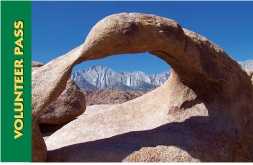
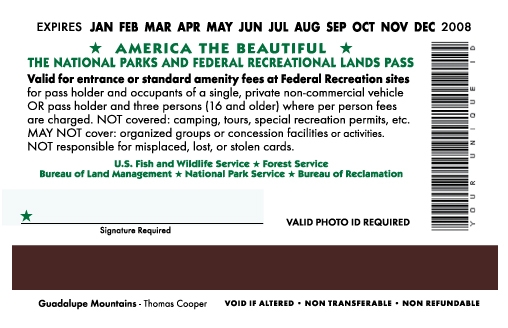
What is the Interagency Volunteer Pass?
Congress authorized the Secretaries of the Departments of Agriculture and the Interior to issue an annual Pass for entrance or standard amenity fees to volunteers in exchange for the performance of significant volunteer services. The Volunteer Pass is one of many ways to recognize a volunteer’s contributions. Individuals who already possess an Interagency Access or Senior Pass do not need an Interagency Volunteer Pass. In cases where someone already possesses an Interagency Pass, supervisors are encouraged to look for other forms of recognition.
Cost
Free
Availability
The Interagency Volunteer Pass will be available through agency-specific volunteer program coordinators.
The Interagency Volunteer Pass may be issued free of charge to volunteers who accrue 500 volunteer hours provided that they do not already have a valid Interagency Pass.
The Interagency Volunteer Pass is valid for one year from the month of issuance.
Volunteers may count any hours accrued beginning January 1, 2007.
There is no specific time frame in which the volunteer hours must be accrued. Once the 500 hour requirement is reached and a Pass is issued, the volunteer’s hours are reset to zero and the count begins again. Only one Interagency Volunteer Pass may be issued per 12-month period.
Interagency Volunteer Passes are not transferable.
Each site should designate a Volunteer Coordinator or staff member to track hours and issue the Interagency Volunteer Passes.
Volunteer Coordinators are responsible for arranging to order Volunteer Passes through USGS or the site’s Interagency Pass point-of-contact.
Validation
The Pass must be punched with an expiration date at the time it is issued. The Pass should be punched for the month in which it is issued.
The Pass will have one signature line. The Pass is not valid until it is signed, so the volunteer must sign the Pass with first and last name when the Pass is issued.
Understanding the 500 Hour Requirement to Earn a Pass
Volunteers may only be recognized with one Pass every 12 months. Once the 500 hour requirement is reached and a Pass is issued, the volunteer’s Pass credit hours reset to zero. If a volunteer gives more than 500 hours in any 12 month period, the Pass-credit hours do not roll over into the next 12 month period. (There are many other instances when a volunteer’s hours WILL roll over, but not for the Volunteer Pass).
An example: Brooke Trout reached her 500th hour in October 2008. In October 2008 she was recognized with a Pass that expired October 31, 2009 and her Pass hours reset to zero. During the following 12 months, from November 2008 to October 2009, Brooke volunteered 1,075 hours, reaching the 500 hour mark in May 2009. However, because Brooke still had a valid Pass from the previous year, she could not be recognized with another Pass until November 2009 (after her first Pass had expired). In November 2009, when she was recognized with her second Pass, her Volunteer Pass hours reset to zero.
Circumstances in Brooke’s life changed after November 2009, and she was only able to volunteer 400 hours during the following 12 months, from November 2009 to November 2010. Therefore, Brooke found she would have to volunteer an additional 100 hours to reach a total of 500 hours worked since issuance of her previous Pass.
2010 2011 2012
J F M A M J J A S O N D J F M A M J J A S O N D J F M A M J J A S O N D
500 Hours

 1,075 Hours
1,075 Hours
(Nov to Oct – 12 months)

 400 Hours
400 Hours
(Nov to Oct – 12 months)
Brooke
is recognized with a Pass and her hours are reset to zero.

Brooke
is recognized with a Pass and her hours reset to zero.
Brooke
needs to volunteer an additional 100 hours to be recognized with
another Pass
![]() =
Awarded Volunteer Pass
=
Awarded Volunteer Pass
= not awarded Volunteer Pass
Additional Information
Motorcycles: At sites with vehicle entrance fees the Volunteer Pass will cover entrance for the Pass owner on one motorcycle only.
Volunteer Coordinators or designated staff members are responsible for ordering Volunteer Passes through USGS or the site’s Interagency Pass point-of-contact.
Student Conservation Association (SCA) hours do count towards a Volunteer Pass.
Each agency has its own form that Volunteer Coordinators use to track volunteer hours, so there is not one official interagency form.
All volunteer activities count toward the 500 hours, so long as they are pre-approved by a Volunteer Coordinator and occur on Federal lands managed by one or all of the five participating REA agencies.
The designated Volunteer Coordinator who verifies that a volunteer has accrued 500 hours is the person responsible for issuing the Volunteer Pass.
Frequently Asked Questions – Volunteer Pass
What is the Volunteer Pass?
A “Volunteer Pass” is an annual Pass awarded to those individuals who volunteer 500 hours at one or more recreation sites managed by five Federal agencies as a way to say "thank you!"
Where can volunteers accrue hours (on which agency lands)?
Volunteer hours may be accrued on lands managed by the following:
Bureau of Land Management (BLM) http://www.blm.gov
Bureau of Reclamation (Reclamation) http://www.usbr.gov
Fish & Wildlife Service (FWS) http://www.fws.gov
USDA Forest Service (USDA FS) http://www.fs.fed.us
National Park Service (NPS) http://www.nps.gov
Where can I find out about volunteer opportunities on Federal recreation lands?
Do we need to stock Volunteer Passes at all locations where other Passes are sold?
No. Volunteer coordinators should work with USGS or the site’s Pass POC to order Volunteer Passes as needed.
How will volunteer hours be recorded and tracked?
The site supervisor or Volunteer Coordinator/Manager should provide timesheets for volunteers to record their hours (maintaining copies for their own record as needed). Additionally, volunteers may log their hours into a central database found on: http://www.volunteer.gov/gov/VT/
Who will issue the Volunteer Pass?
The Site Supervisor/Volunteer Coordinator/Manager who authorizes that a volunteer has accrued 500 hours.
Can a volunteer accrue hours on lands managed by more than one Federal agency, or can they only accrue them by volunteering with one agency?
A volunteer can accrue 500 hours by volunteering on Federal recreation lands managed by one or all of five agencies - NPS, BLM, USDA FS, FWS, and Reclamation. For example, they can volunteer 100 hours for each of the five agencies and earn a Pass.
What type of volunteer activities/projects count towards 500 Volunteer Pass hours?
All activities that have been pre-approved by the Site Supervisor/Volunteer Coordinator count toward the required 500 hours.
If a person volunteers more than 500 hours in 12 month period, do they receive additional Passes?
No. If a volunteer works more than the 500 hours over a 12 month period they earn only one Pass.
Can a volunteer give their Pass to someone else if they already have an annual or lifetime pass?
No. Volunteer Passes are non-transferable and may not be given to someone else or traded in for cash equivalent. The Volunteer Pass is only one means of recognizing a volunteer, so if a volunteer already has a Pass, other types of acknowledgement should be offered in place of a Pass.
What if someone shows up with an un-punched Volunteer Pass?
Punch the current month; make sure the Pass owner’s signature is on the back of the card; and verify that the signature matches identification.
REMEMBER: Refer to the General Pass Rules and Benefits on Page 9 that apply to ALL Interagency Passes
SUPPLEMENTAL MATERIALS - HANGTAG
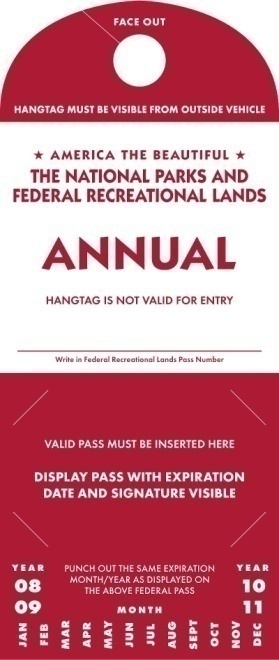
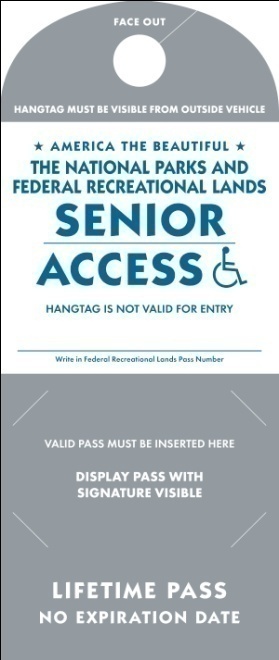
Side 1 Side 2
What is a Hangtag?
Many agency recreation sites are not regularly staffed by fee collection or enforcement personnel. At these sites, Pass owners are required to display the Pass in the vehicle window using a hangtag so that the expiration date is clearly visible for compliance checks. The hangtag makes it easier for enforcement personnel to view the Pass and the expiration date.
Hangtags are double-sided; one side has an expiration date for the Interagency Annual / Volunteer Passes and the other side for the Interagency Senior / Access Passes.
Hangtags alone are not Passes and are not valid for entry or use.
Hangtags are not considered accountable property.
Cost
Free to valid Pass owners
Availability
All sites issuing Passes must stock hangtags. Additional hangtags may be ordered from the USGS Store as needed.
Whenever an Interagency Pass is issued, all visitors should be offered a hangtag.
Validation and Use
Hangtags issued for the Interagency Annual and Interagency Volunteer Pass must be marked with the same expiration date as the Pass. The expiration date on the hangtag is more visible to enforcement personnel than the one on the Pass.
Hangtags issued for the Interagency Senior and Interagency Access Passes do not require an expiration date, as they are lifetime passes.
The hangtag itself is not valid for entrance or standard amenity fees. It is only a means of displaying the actual Pass. When a hangtag is issued, the visitor must be told that the hangtag is only a means of displaying the Pass at unstaffed sites.
Frequently Asked Questions - Hangtag
Should a hangtag be given out with every Pass?
All sites are encouraged to give out a hangtag with every Pass.
What if a visitor shows up at a staffed entrance station site and presents their Hangtag for entry, should they be allowed to enter?
No. Hangtags alone are not sufficient for entry; a valid Pass must be shown.
SUPPLEMENTAL MATERIALS – DECAL
***Decals may be issued to ALL Pass holders!***
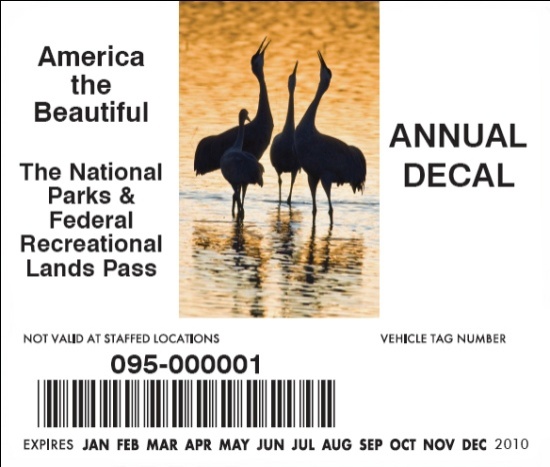
Image and decal serial numbers change each year
What is a Decal?
Many agency recreation sites are not regularly staffed by fee collection or enforcement personnel. At unstaffed sites, Pass owners are required to display proof of payment by leaving the Pass visible through a vehicle windshield. Pass holders driving open topped vehicles (e.g., jeeps, motorcycles, etc) risk the Pass being stolen. Therefore a decal is offered to all Interagency Pass owners with open-topped vehicles. The decal allows visitors to display proof of payment on the vehicle without leaving the Interagency Pass unsecured.
Note: All sites that issue Interagency Passes must have at least a small supply of decals available. This is an important customer service aspect of the program.
There are no lifetime decals; the same Annual decal is used for all four Passes.
Decals for Interagency Annual and Volunteer Passes expire when the Pass expires. The image on the Annual or Volunteer Pass must match the image on the decal being issued. (i.e., In February 2011 a visitor comes in with a valid 2010 Annual Pass punched to expire September 2011 and would like a decal. The visitor would be issued a 2010 decal punched to expire September 2011.)
Decals for Interagency Senior and Access Passes expire one year from issuance of the decal. The current year’s decal will always be issued and punched so it is valid for 12 months (i.e., In June 2010 a visitor comes in with a valid Senior Pass and would like a decal. The visitor would be issued a 2010 decal punched to expire June 2011 valid 1 year).
Decals may be issued to Golden Age and Golden Access Passes in the same manner as the Interagency Senior and Access Passes.
Cost
Decals are free.
Availability
The decal is available at Federal recreation sites that charge an entrance or standard amenity fee and many Federal agency offices.
All sites that issue the Interagency Passes must stock decals, even if they do not have unstaffed areas. Sites may stock a small supply of decals—it is not necessary to have an equal number of decals and Passes. Additional decals may be ordered from the USGS Store as needed.
Decals should be offered any time an Interagency Pass is issued to someone driving an open top vehicle if he or she plans to visit unstaffed Federal recreation sites.
Decals for lifetime passes are issued annually due to;
Deterioration of decals over time
Transfer of vehicle ownership over time (purchase new vehicles in lifetime)
Validation / Issuance
Step 1: Verify Eligibility
Although there is no formal limit on the number of decals that can be issued to a Pass owner, most Pass owners will be eligible for only one or two decals because issuance of a decal requires 3 things:
A valid Interagency Pass (Senior, Access, Annual, Volunteer or Golden Age or Golden Access);
Photo ID to verify Pass ownership;
Vehicle registration from a motorcycle or other open topped vehicle that matches the name(s) of the Pass owner(s) and the photo ID.
Note: Sites may not create a log or retain any information about visitors who are issued decals.
2) Step 2: Issue the decal
Once eligibility has been established a decal can be issued. To do this the issuing officer must:
From the information on the registration provided by the Pass owner write the license plate number/s on the face of the decal/s in the space provided under Vehicle Tag Number.
Punch the decal expiration date:
For Interagency Annual and Volunteer Passes, decal(s) must be punched with the same expiration date as the Pass, regardless of when the decal is issued. Remember the images on the Pass and decal must match
For Interagency Senior and Access Passes, the decal must be punched with an expiration date one year from issue
Inform the Pass owner that decals must be placed on the lower right hand side of automobile windshields, or on the front of a motorcycle in a clearly visible place.
Decal Use
IMPORTANT! The decal alone is not sufficient to cover entrance or standard amenity fees. When a decal is issued the visitor must be told that the decal is only valid at unstaffed sites for open topped vehicles; at staffed Federal recreation sites. A valid Interagency Annual Pass or Interagency Volunteer Pass must be presented to enforcement personnel upon request.
At unstaffed Federal recreation sites, each open-topped vehicle must display a valid decal.
Decals are designed to deteriorate if tampered with, so they are inherently non-transferable.
Frequently Asked Questions – Decal
Should I issue a decal to every Pass owner?
If the Pass owner has an open topped vehicle and requests a decal is should be issued.
How many decals can be issued per Pass?
There is no limit to the number of annual decals that may be issued to a Pass owner. However, for EACH open-topped vehicle, the Pass owner must present a) valid Pass b) vehicle registration and c) driver’s license – all of which must have matching names.
INVENTORY
Ordering Pass and Supplemental Material Stock
Passes, hangtags, decals, and the “America the Beautiful – the National Parks and Federal Recreational Lands Pass” brochure can be ordered from the USGS Store:
email at fedrecPass@usgs.gov
fax at 303-202-4693
phone at 1-888-ASK-USGS, option 1; (1-888-275-8747, option number 1)
USGS web store using the “Business Partners” link (http://store.usgs.gov)
A standard order form must be used for faxed orders. To place orders you must be a designated point-of-contact (or alternate) at your site and have a user-id and Password. Contact USGS for assistance with a user-id and Password.
All ordering sites are required to provide a FedEx or UPS account number with each order. Agencies/sites will be responsible for paying shipping charges associated with orders. Orders are encouraged to be in units of 50, however, smaller quantities may be ordered. The minimum order is 5, however larger orders are preferred.
To minimize costs, it is important for field sites to carefully evaluate inventory needs The costs of the Interagency Pass Program are significant. Currently field and other sales locations pay only the shipping costs. All other costs of the program such as product design, production, fulfillment, call center, overhead and marketing, are paid for with the revenue from central sales, i.e., USGS website and partner sales. The Interagency Annual Pass, Interagency Volunteer Pass, and decals are re-designed and re-produced each year; therefore, “leftover” stock cannot be re-used. If central sales revenue is not sufficient to cover Pass program costs, it is possible that agencies and field sites could be responsible for the costs of the program.
Please Note: We recommend that field sites keep a limited supply of the previous year’s Interagency Annual Pass, Volunteer Pass and decals on hand for customer service needs (damaged Pass exchange, upgrades, etc.)
Damaged or Missing Stock
Due to the high volume of stock received at the USGS warehouse it is not feasible for USGS to check every box for damaged or missing Passes. They conduct quality control inspections on a percentage of the inventory they receive. When USGS finds a missing or damaged Pass they remove the Pass from the box and identify that the Pass was removed.
Upon receiving a shipment from USGS, all sites should immediately verify that the shipment matches what was ordered. Orders that arrive damaged or with a substantial number of missing Passes should be brought to the immediate attention of USGS.
SALES and ACCOUNTABILITY
Pass Sales
REA requires that Passes be available for purchase at Federal recreation sites that charge an entrance or standard amenity fee, and that are staffed by fee collection personnel. REA also allows for sale of Passes through agreements with third parties for Pass sales services. These may include contracts with a government or non-governmental entity, including those in a gateway community. (Contact your Regional Fee Manager for sample agreement template)
Pass sales must be tracked by the Pass serial numbers.
Upgrades
At this time the National Park Service is the only agency that has elected to upgrade its entrance fees and site-specific and regional Passes to the Interagency Pass; however, all participating REA agencies have the authority to determine appropriate circumstances for refunds and upgrades within their own agency.
If an agency chooses to upgrade its own agency’s entrance or standard amenity fees, site-specific or regional Passes, the upgrade policy and procedures must apply agency-wide.
The National Park Service has established a service-wide policy of providing upgrades of National Park Service entrance fee receipts and NPS park-specific Annual Passes.
Following is the National Park Service upgrade policy:
An upgrade will occur at a National Park site if a visitor pays an entrance fee or buys a site-specific Annual Pass at a National Park and later decides he or she would prefer an Interagency Annual Pass. The National Park entrance receipt, Automated Fee Receipt, or site-specific Annual Pass may be turned in at the site where it was purchased OR at any other NPS site and the cost will be credited toward the $80.00 Interagency Annual Pass.
Detailed information about the NPS upgrade policy can be found in NPS Reference Manual 22 (RM 22)
NOTE:
Upgrades create extra work for everyone. To avoid abuse of the upgrade policy, visitors should only be informed of the NPS upgrade policy when they are having trouble deciding what they should purchase. Each visitor that enters a park does not need to be told about the upgrade option.
Voids/Refunds/Returns
Please follow individual agency guidelines for refunds for voids, refunds, returns.
Exchanging Receipts from Automated Fee Machines
.
NPS uses automated fee machines (AFM) to sell the $80.00 Interagency Annual Passes. Most AFMs only issue receipts for the Passes, not the actual Pass. These receipts need to be exchanged for an actual Pass at any NPS site that sells the Interagency Annual Pass. All NPS sites that sell the Interagency Annual Pass are required to honor valid AFM receipts for the $80.00 Interagency Annual Pass.
Damaged Passes
Damaged Passes will be replaced if the owner provides identification to validate ownership and presents the Pass with at least a portion identifiable. The damaged Pass must be kept by agencies for a specified period of time for accountability purposes. Each Federal recreation site will need to keep a small supply of the previous year’s Passes on hand for these replacements.
Lost or Stolen Passes
Passes cannot be replaced if lost or stolen. A new Pass must be purchased. Although the goal is to acquire the technology to be able to track, cancel, and or replace Passes, we are unable to do so at this time.
Pass Misuse
Since all Passes are non-transferable the verification of Pass ownership is a legitimate component of the program. Photo identification will be requested to verify Pass ownership. When Passes are sold, visitors should be informed that they will be required to show identification when they use their Pass.
When a visitor presents a Pass for entrance, a valid form of photo identification will be requested, such as a Passport or driver’s license that includes the visitor’s signature.
Verify that the name on the identification matches the name on the Pass.
Compare the signatures on the Pass and the photo identification; they should match. If the visitor is unable to produce valid signature identification, the visitor may be asked to sign a piece of paper for verification. All signature verification papers are destroyed at the end of each shift and any personal information obtained through the identification process is not maintained as part of permanent records.
Identification must be checked routinely and must not be based on visitor ethnicity, race, or appearance.
Currently the National Park Service has a Pass misuse policy that consists of marking Passes that have been misused with a red check mark. Passes that are misused twice (marked with two red checks) are considered void. A useful part of a Pass misuse procedure is to provide an information sheet to the visitor about proper use of Passes. Confiscation of misused Passes varies by agency and site.
Examples of Pass misuse include:
Local residents who rent out their homes and leave annual Passes for the renters to use (this can be remedied by checking identification with Pass use).
Rental vehicle companies that supply an annual Pass with a rental that is used again the next time the vehicle is rented.
A Senior Pass owner “loaning” his Pass to a friend or relative.
Accountability
Maintaining strict control of Pass inventory is critical to the integrity of the Interagency Pass program. All Passes and decals have serial numbers printed on them for this purpose. When Passes are received the agency point of contact must verify inventory against the packing slips. All serial numbers must be correct and accounted for. Follow individual agency specific guidelines for tracking and transferring accountable property.
Pass sales must be accounted for, by serial number, on a daily report. This is true whether the Passes are sold, voided, refunded, upgraded, etc. Follow individual agency specific guidelines on deposits and remittance of Pass revenue.
All unsold Annual Passes and decals must be destroyed at the end of each calendar year in accordance with your agency’s Property Destruction Policies and Procedures. Sites must keep a few of the previous years’ Passes on hand for customer service issues that might arise.
Every site is required to annually reconcile Passes sold or distributed at the site against revenue collected for all types of Passes. Each agency will designate points of contact responsible for ordering, distributing, returning and reconciling Pass sales each year. It is much easier to have your site’s tracking and reconciliation procedures in place at the beginning and to maintain them throughout the year.
THIRD PARTY SALES AGREEMENTS
(See Interagency Pass Marketing Policy)
REA allows the government to establish sales and marketing relationships with third party vendors that wish to participate in the program, and will encourage vendors to sell the Annual Pass as a convenience to customers. Management of large or national third party agreements is the responsibility of the National Pass Program Office. Management of local third party agreements will be the responsibility of the individual Federal recreation site(s).
There are many reasons that sites might choose to enter into a third party agreement with a vendor for Pass sales. Agreements can enhance customer service, increase cost efficiency, improve employee safety, or aid in building relationships with partners and stakeholders.
Field sites considering working with a third party partner should carefully review Interagency Pass Marketing Policy and consult with their appropriate regional or national fee coordinator, solicitor and contracting officials, to ensure that the proper agreement is used.
WHERE ARE THE INTERAGENCY PASSES ACCEPTED?
Bureau of Land Management (BLM)
BLM oversees more than 262 million unbounded acres -- the largest of the Federal agencies –– with abundant outdoor recreational activities. These lands include congressionally designated wild and scenic rivers, wilderness areas, and high deserts.
For information on BLM sites visit http://www.blm.gov
Bureau of Reclamation (Reclamation)
Reclamation manages and develops water and related resources. There are approximately 300 recreation areas on these water projects, many of which are operated by other Federal agencies; state, county, and city governments.
For information on Reclamation sites visit http://www.usbr.gov
Fish & Wildlife Service (FWS)
FWS manages over 100 million acres of land and water consisting of more than 546 national wildlife refuges, 37 wetland management districts with waterfowl production areas, 46 administrative sites, and 69 national fish hatcheries. Many refuges are open to hunting and fishing.
For information on FWS sites visit http://www.fws.gov
Forest Service (USDA FS)
USFS offers a variety of outdoor recreational opportunities and special areas on 193 million acres of national forests and grasslands. Approximately 18% of national forestland is congressionally designated wilderness, providing opportunities for primitive recreation experiences and spectacular scenery.
For information on USDA FS sites visit http://www.fs.fed.us
National Park Service (NPS)
The NPS protects the Nation’s natural, historical, and cultural resources, while providing opportunities for recreation. NPS manages more than 390 national parks, battlefields, seashores, monuments, and historic sites nationwide.
For information on NPS sites visit http://www.nps.gov
Additional information:
Reservations for Federal recreation facilities - http://www.recreation.gov
The Federal Lands Recreation Enhancement Act of 2004 - http://www.doi.gov/initiatives/recreation_feeprogram.html
DEFINITIONS
Code of Federal Regulations (CFR): A codification of the general and permanent rules published in the Federal Register, the Executive departments, and agencies of the Federal Government.
Commercial Group: One or more persons traveling on an itinerary that has been packaged, priced, or sold for leisure or recreational purposes by an organization that realizes financial gain by providing the service.
Concession Fees: Rates charged to the public by concessionaires for services such as lodging or food.
Concessionaire: An individual or private entity authorized by permit or contract to operate a business on Federal land.
Concessionaires may be contracted by the Federal agencies to manage accommodations, facilities, and other operations. Services they provide may include collecting entrance, expanded amenity, and/or transportation fees on behalf of the Federal government.
Designated Fee Area: A Federally operated site that has been designated as a recreational fee area and authorized to charge fees in accordance with the Federal Lands Recreation Enhancement Act of 2004.
Disability, permanent: A permanent physical, mental, or sensory impairment that substantially limits one or more major life activities, such as caring for oneself, performing manual tasks, walking, seeing, hearing, speaking, breathing, learning, and working. See 7 CFR §15e.103; see also 29 U.S.C. §705(20).
Domicile: The permanent residence of a person or the place to which s/he intends to return even though s/he may reside elsewhere. A person may have more than one residence, but has only one domicile. The country in which a person is eligible to draw Federal health and retirement benefits is usually the country in which s/he is domiciled. See “Domicile” Page 10.
Entrance Fee: Fee charged to access lands managed by NPS and FWS.
Expanded Amenity Fee: Fee charged for specialized facilities and services beyond entrance fees and standard amenity fees. Examples include campgrounds, boat launches, recreation rentals, and guided tours.
Fee Demonstration (“Fee Demo”): A temporary legislative authority that allowed parks and other Federal sites to charge reasonable fees and retain revenues generated by park entrance receipts, activities, and services. (Recreational Fee Demonstration Program Omnibus Consolidated Rescissions and Appropriation Act of 1996, PL 104-134, section 315).
Land and Water Conservation Fund Act of 1965 (LWCFA): Federal law mandating the development of a program to charge entrance and activity (use) recreation fees, based on the premise that persons using certain federal facilities and services should pay a greater proportion of the operating costs than the general taxpayer.
Non-Commercial Vehicle: Passenger car, van, pick-up truck, converted school bus, recreational vehicle, or similar vehicle. This term does not include a motorcycle, motor scooter, motor bicycle, moped, snowmobile, or non-motorized bicycle.
Pass Owner: The person(s) who are issued a recreation Pass and identified by the signatures on the back of the Pass.
Special Recreation Permit Fee: Fee charged for special facilities and services such as rock climbing permits, commercial and vending use, off-road vehicle use, competitive and special events, organized group activities, and individual or group use of special areas.
Standard Amenity Fee: Fee charged for use of BLM, FS, and Reclamation sites that have a combination of basic amenities – picnic tables, trash receptacles, toilets, developed parking, interpretive signing, and security.
Third Party Sales Arrangements: Sales and marketing relationships, formalized as agreements or contracts with third party vendors to sell the Interagency Annual Pass on behalf of the government.
Upgrade: When money spent on a previously purchased entrance fee, standard amenity fee, or Pass is credited to the purchase of a higher-priced Pass.
Validation: Pass expiration date punched and signature.
| File Type | application/vnd.openxmlformats-officedocument.wordprocessingml.document |
| File Title | Table of Contents |
| Author | CHRIS |
| File Modified | 0000-00-00 |
| File Created | 2021-02-01 |
© 2026 OMB.report | Privacy Policy
